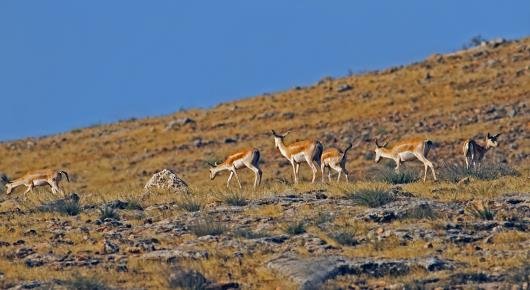New FAO project protects Turkey’s unique steppe lands, biodiversity

The steppes of Turkey’s Anatolia region are ecologically important yet vulnerable ecosystems, covering nearly 40 percent of the country. Now a new FAO project is bringing into focus the steppes of Sanliurfa province – known for its rich biodiversity and well-preserved steppe ecosystems.
Located in the fertile plains between the Tigris and Euphrates rivers, the Sanliurfa steppes are subject to wildlife habitat loss, unsustainable land practices, and adverse effects of climate change.
“FAO has a strong comparative advantage in thematic areas to be addressed by the project, such as pasture management, biodiversity, and a landscape-based approach,” said Yuriko Shoji, FAO Representative in Turkey and Subregional Coordinator for Central Asia, speaking at a recent workshop in Ankara to launch the project. “The lessons learned and achievements in Sanliurfa could be replicated, enabling a sharing of knowledge and experiences at subregional level too.”
The region’s biodiversity is rich: the province is home to Turkey’s only remaining population of free-ranging goitered gazelle, which is an indicator of healthy steppes. The sociable lapwing is a critically endangered wading bird that relies on the region’s steppes during its migration period. Other important fauna include insects, birds, reptiles and mammals listed under the International Union for Conservation of Nature’s Red List of Threatened Species.
Financed by the Global Environment Facility, or GEF, the FAO project will address challenges in the region linked to conservation and development. Some areas of the steppes were converted to agriculture in the early 1990s and exposed to intensive agricultural practices. Population growth and infrastructure development contributed to deterioration of remaining steppe areas.
Overgrazing threatens the integrity of ecosystems, and the number of livestock and intense grazing practices are on the rise. Overharvesting of medicinal plant species with high commercial value is another problem.
The project will provide guidance to local pastoralists and herders – helping people to maintain their livelihoods while deepening their understanding of unsustainable practices that lead to habitat loss.
Climate change adds to the pressure on region’s steppes. A significant decrease in rainfall could affect steppe lands, diminishing soil cover, exposing it to erosion and worsening the impact of overgrazing.
For this, a sustainable grazing management programme will be operated and monitored at three pilot sites. Extension staff from two ministries will be trained on how to align steppe conservation with agricultural production activities in grasslands.
Two of the pilot areas – Kizilkuyu Wildlife Reserve and Tek Tek Mountains National Park – are already under protection by law. The project will put in place more effective management plans for these sites. Kizilkuyu hosts various animal species – including free-ranging gazelle, Great Bustards, and the cream-colored courser – while the Tek Tek Mountains are defined as forest steppe and include the world’s last remaining wild pistachio forests.
The project’s third pilot site is Karacadag – best known for being the center of early wheat domestication – is identified as a key biodiversity area but lacks formal protected status. One of the project’s objectives is to establish a protected area in the Karacadag steppes, which host numerous rare and endangered plant species including “wild hot spring wheat.”
A significant planned outcome of the project will be a steppe conservation strategy at national and province (Sanliurfa) level. The strategy will help adopt an ecosystem-based approach that promotes ecological connectivity among protected areas through the implementation of buffer zones and ecological corridors. The strategy will aim to strengthen institutional and policy frameworks to promote conservation and sustainable land use practices among local people and decision makers.
The project is financed by the Global Environment Facility, with FAO as implementing agency. Turkey’s Ministry of Forestry and Water Affairs and Ministry of Food, Agriculture and Livestock are the executing partners. General Directorates of both Ministries – Nature Conservation and National Parks and Plant Production, respectively, are actively involved in project implementation. With partner contributions, the project’s total budget is nearly US$ 12 million.
9 June 2017, Ankara, Turkey
